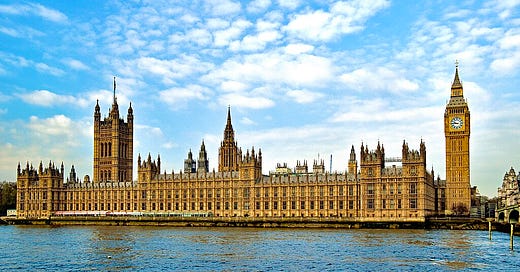Lobbyists pour £700,000 into cross-party parliamentary groups
Despite new transparency rules, fossil fuel firms, vaping companies and other private interests are still bankrolling All-Party Parliamentary Groups
By Peter Geoghegan and Russell Scott
In theory, all-party parliamentary groups (APPGs) are a great idea. MPs and members of the House of Lords coming together informally, bringing in experts, stakeholders and the public to focus on a specific issue, whether that’s Grenfell-style cladding or child poverty.
In practice, APPGs have often been a backdoor for lobbyists. Arms firms, tech companies, private healthcare, and shady foreign governments have spent millions bankrolling these often opaque groups.
That’s why earlier this year new rules for APPGs were brought in to improve transparency and reduce foreign influence.
But Democracy for Sale has found that, despite the new restrictions, lobbyists are still pouring money into APPGs.
Fossil fuel firms, the vaping industry and weapons manufacturers have pumped at least £700,000 into these cross-party parliamentary groups, according to new data.
Transparency campaigners said our findings raised “legitimate questions about the undue influence” of industry funders on cross-party parliamentary groups.
“Parliamentarians should ask themselves why outside actors would choose to fund their APPG and what they might be expecting in return,” said Rose Whiffen, senior research officer at Transparency International UK.
While there has been a sharp decrease in the number of APPGs since the recent rule changes came into force, lobbyists and private interests are still funding dozens of groups.
On September 9 the APPG on Carbon Capture - a controversial technology that aims to limit climate change by trapping and storing carbon dioxide - held its first AGM of the new parliament.
The group, chaired by Labour MP Luke Myer, has registered up to £9,000 in financial support from the Carbon Capture and Storage Association (CCSA), which is also acting as the APPG’s secretariat and public facing point of contact.
Members of CCSA include fossil fuel giants BP, ExxonMobil, Shell and Drax - branded the UK’s biggest carbon polluter. Drax has also committed funds to the Renewables and Sustainable Energy APPG in recent months.
Earlier this month, the government pledged £22bn for Carbon Capture capture and storage (CCS) projects.
The initial funding for two "carbon capture clusters" on Merseyside and Teesside, over the next 25 years, would create thousands of jobs, provide private investment and could help the UK meet its climate goals, according to the government.
However, Doug Parr, policy director at Greenpeace UK, told the Guardian that “for a government that is committed to tackling the climate crisis, £22bn is a lot of money to spend on something that is going to extend the life of planet-heating oil and gas production.”
Elsewhere, the gas industry has given a lobbying firm more than £28,500 to run a parliamentary group urging ministers to back new fossil fuel projects.
The all-Party parliamentary group on hydrogen was set up in 2018 and has been reactivated for the new parliamentary term. The APPG has previously lobbied the government to support “blue hydrogen”, which is made from natural gas, and for “hydrogen-ready boilers”, which burn natural gas.
Lobbying firm Connect was paid £30,000 by fossil fuel companies including Norwegian energy giant Equinor to act as the hydrogen APPG’s secretariat. Equinor also holds an interest in “several hydrogen projects in the UK” and is currently at the center of a legal challenge over its controversial Rosebank oil and gas development in the North Sea.
The Deep Geothermal APPG is funded to the tune of £40,000 by fracking company IGAS Energy and the world's largest oilfield services firm Schlumberger amongst others. The Net Zero APPG’s £33,000 in sponsorship includes funding from Centrica, which has been accused of “misleading” customers over its green energy claims.
The Apprenticeship APPG has received more than £54,000 in funding, including from BAE Systems and Babcock, who have been criticised for supplying the Israeli military with weapons, components and military technology.
Tobacco influence
The Independent British Vape Trade Association (IBVTA) has committed £37,500 as the sole backer of an all-party parliamentary group for “responsible vaping”, which was registered in April and is chaired by Labour MP Mary Glindon.
The vaping industry has given more £470,000 in donations to MPs and parliamentary groups over the last six years, according to analysis by the i newspaper.
The APPG for Responsible Vaping and its MPs and peers have criticised plans to restrict vaping flavours, warning that they could lead to an increase in smoking – echoing claims made by the vaping industry.
Last year, this newsletter revealed that the then deputy of the APPG on vaping, Tory MP Adam Afriyie, had taken a Big Tobacco-funded trip to South Korea companies. Afriye, who stepped down ahead of the last general election, had previously failed to declare his wife’s shares in a vape firm.
Andy Rowell, investigations lead at the Tobacco Control Research Group at the University of Bath, said that “although the APPG on Responsible Vaping says it is independent of the tobacco industry, its parliamentary members have taken hospitality off the tobacco industry or voted against a smoking ban. So, there are legitimate questions about the undue influence of the tobacco industry on the APPG and its members.”
Concerns had previously been raised that the new rules for APPGs would still provide easy access to politicians for lobbyists.
“Parliament's new rules require much more transparency from APPGs, but we're seeing a very mixed picture in practice,” said Alex Parsons, senior researcher at mySociety, which is currently running a project called ‘WhoFundsThem’ focused on encouraging better disclosures from APPGs.
“APPGs serve a legitimate purpose in bringing together MPs on areas of common interest - but their dependence on outside support can make them an appealing backdoor route into Parliament,” added Parsons.
Earlier this year, Democracy for Sale revealed that one PR firm had rebranded all of its APPGs in an apparent attempt to evade the new transparency rules.




